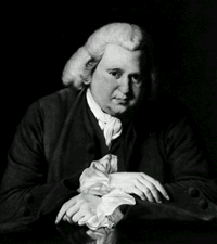Charles Darwin's grandfather, Erasmus Darwin, was one of the
leading intellectuals of eighteenth century England, a man with a remarkable
array of interests and pursuits. Erasmus Darwin was a respected physician, a
well known poet, philosopher, botanist, and naturalist.
As a naturalist, he formulated one of the first formal theories on evolution
in Zoonomia, or, The Laws of Organic Life (1794-1796). He also
presented his evolutionary ideas in verse, in particular in the posthumously
published poem The Temple of Nature. Although he did not come up with
natural selection, he did discuss ideas that his grandson elaborated on sixty
years later, such as how life evolved from a single common ancestor, forming
"one living filament". He wrestled with the question of how one
species could evolve into another. Although some of his ideas on how evolution
might occur are quite close to those of Lamarck,
Erasmus Darwin also talked about how competition and sexual selection could
cause changes in species: "The final course of this contest among males
seems to be, that the strongest and most active animal should propogate the
species which should thus be improved". Erasmus Darwin arrived at his
conclusions through an "integrative" approach: he used his
observations of domesticated animals, the behaviour of wildlife, and he
integrated his vast knowledge of many different fields, such as paleontology,
biogeography, systematics, embryology, and comparative anatomy. This "integrative"
approach is the very foundation upon which the U.C.
Museum of Paleontology and the recently formed Integrative
Biology Department at the University of
California at Berkeley are built.
In addition to Erasmus Darwin's contributions to the future of biological
studies, he was also a leader in an intellectual community that contributed to
the emergence of the industrial era. Among his intellectual peers were James
Watt, Matthew Boulton, Joseph Priestly, and Josiah Wedgwood. It is probably no
coincidence that Charles Darwin, the grandson of such a progressive thinker,
produced some of the most important work in the history of biological and social
thought.
More information about Erasmus
Darwin's evolutionary thought and its impact can be found at the Victorian
Web, an important resurce for the history and culture of the Victorian
period.
[Fechar]
